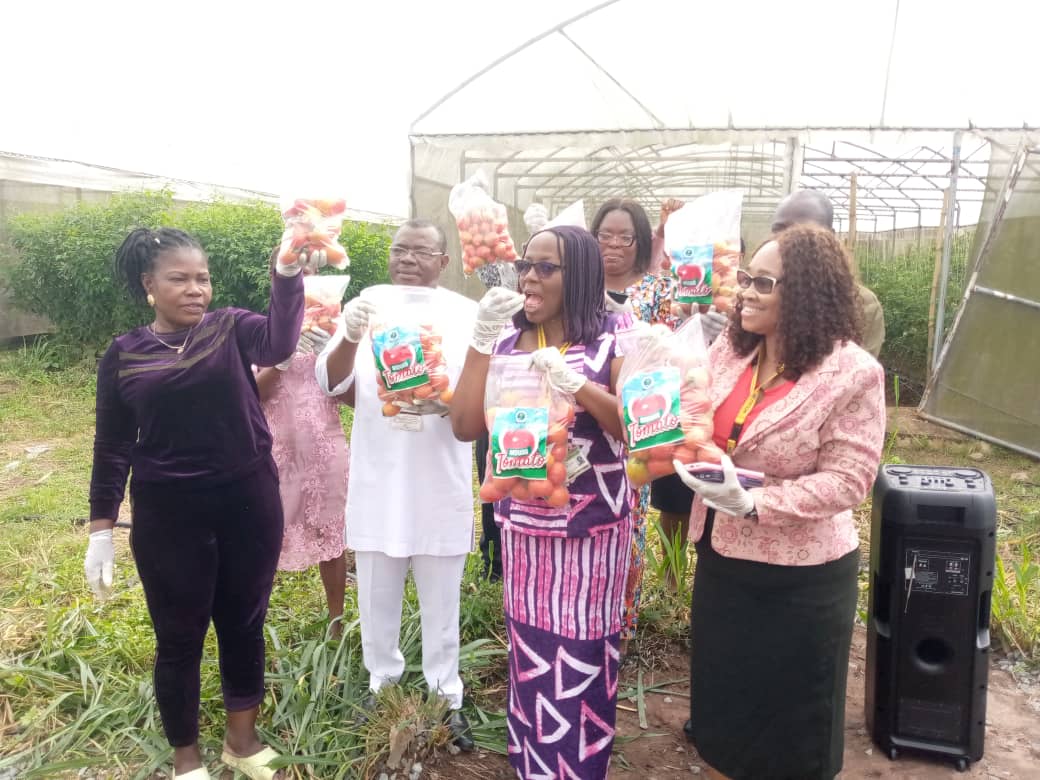Michael Okpara University of Agriculture, Umudike (MOUAU), has officially flagged off the 2025 harvest season of its greenhouse-grown tomatoes and peppers.
This, according to the institution is a key milestone in its Smart-Agriculture initiative aimed at addressing the persistent supply gaps in Southeastern Nigeria.
Declaring the harvest open, Vice-Chancellor of MOUAU, Prof. Maduebibisi Ofo Iwe, reaffirmed the university’s commitment to advancing agricultural expertise and enhancing food security nationwide.




Represented by the Deputy Vice Chancellor (Academic), Prof. Nneoma Elechi Obasi, the Vice-Chancellor emphasized the nutritional importance of tomatoes, describing them as a rich source of essential micronutrients crucial for combating hidden hunger across households.
“Tomatoes may not solve all aspects of food insecurity, but they play a critical role in addressing micronutrient deficiencies, especially when consumed alongside fruits, vegetables, carbohydrates, and protein-rich foods,” Prof. Iwe noted.
He stressed that the greenhouse initiative is not solely about production but also serves academic purposes by supporting teaching, research, and learning among others.



Prof. Iwe who urged Nigerians to explore home gardening by planting tomatoes in containers/buckets as a cost-effective way to improve household nutrition, further called on governments and NGOs to invest in tomato and pepper production as a sustainable and profitable venture that can engage unemployed youths.
In her remarks, the Supervisor of the MOUAU Greenhouse and a Professor of Soil Science, Prof. Mabel Ifeoma Onwuka, disclosed that the university’s greenhouses are managed under an integrated system that utilizes both organic and inorganic fertilizers with irrigation.
She noted that the current batch of crops was planted in April 2025, and that demand has already grown beyond the university community, attracting buyers from both urban and rural areas.
Prof. Onwuka, who also serves as the Director of the Centre for Gender, Youth and Child Development, emphasized the socio-economic relevance of the project.
She said: “We are happy to bridge the supply gap in tomato and pepper production.”
Prof. Onwuka urged Abia State Governor, Dr. Alex Otti, and other Southeast Governors to replicate similar greenhouse initiatives across all Local Government Areas (LGAs), stressing that this would reduce the region’s long-standing dependence on produce from Northern Nigeria.
According to her, Southeastern states—particularly Abia—continue to face seasonal shortages of tomatoes and peppers, with local output falling far short of meeting year-round demand.
She described the MOUAU greenhouse model as a climate-controlled, high-yield, and sustainable solution capable of transforming local production and distribution systems.
“This is a sustainable model delivering farm-fresh produce directly to consumers, supported by academic research and strong community engagement.
“By replicating such systems, states can reduce importation, improve food security, stimulate local economies, and create jobs”, Onwuka further noted.
The Agriculturist maintained that MOUAU greenhouse initiative stands as a practical demonstration of agricultural innovation and food system resilienc; setting an example for institutions, governments, and development partners across Nigeria.
Present at the event were several key university officials, including the Deputy Vice-Chancellor (Administration), Prof. Ursula Akanwa; the Director, Centre of Excellence in Root Crop Research and Development, Prof. Gregory Onwuka; the University Librarian; Prof. Ogbonna, Director of Audit; Mr. Ndubuisi Mgbemena, the University Public Relations Officer (PRO); Dr. Ubadire Agua, members of the organizing team—Mr. Chibueze Onyejuruwa, Mrs. Esther Ugwu Otta, and Dr. Amajuoyi, among others.
The event also brought together stakeholders across the agricultural sector, various departments and units of the institution, underscoring the university’s commitment to administrative excellence and academic innovation.

























